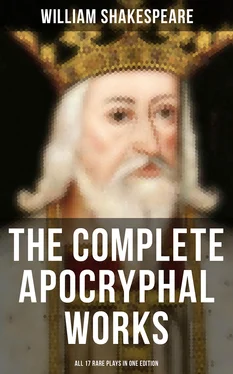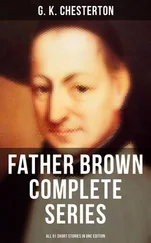[Sam calls within. Where are you there?]
SAM. Boy, look you walk my horse with discretion; I have rid him simply. I warrant his skin sticks to his back with very heat: if a should catch cold and get the Cough of the Lungs I were well served, were I not?
[Enter Sam. Furnisht with things from London.]
What, Ralph and Oliver.
AMBO. Honest fellow Sam, welcome, yfaith! what tricks hast thou brought from London?
SAM. You see I am hangd after the truest fashion: three hats, and two glasses, bobbing upon em, two rebato wires upon my breast, a capcase by my side, a brush at my back, an Almanack in my pocket, and three ballats in my Codpiece: nay, I am the true picture of a Common servingman.
OLIVER.
I’ll swear thou art. Thou mayest set up when thou wilt.
There’s many a one begins with less, I can tell thee, that
proves a rich man ere he dies. But what’s the news from
London, Sam?
RALPH.
Aye, that’s well said; what’s the news from London, Sirrah?
My young mistress keeps such a puling for her love.
SAM.
Why, the more fool she; aye, the more ninny hammer she.
OLIVER.
Why, Sam, why?
SAM.
Why, he’s married to another Long ago.
AMBO.
Yfaith, ye jest.
SAM. Why, did you not know that till now? why, he’s married, beats his wife, and has two or three children by her: for you must note that any woman bears the more when she is beaten.
RALPH.
Aye, that’s true, for she bears the blows.
OLIVER. Sirrah Sam, I would not for two years wages, my young mistress knew so much; she’d run upon the left hand of her wit, and ne’er be her own woman again.
SAM. And I think she was blest in her Cradle, that he never came in her bed; why, he has consumed all, pawnd his lands, and made his university brother stand in wax for him—There’s a fine phrase for a scrivener! puh, he owes more then his skin’s worth.
OLIVER.
Is’t possible?
SAM. Nay, I’ll tell you moreover, he calls his wife whore as familiarly as one would call Mal and Dol, and his children bastards as naturally as can be.—But what have we here? I thought twas somewhat puld down my breeches: I quite forgot my two potingsticks. These came from London; now any thing is good here that comes from London.
OLIVER.
Aye, far fetcht you know.
SAM. But speak in your conscience, yfaith, have not we as good Potingsticks ith Country as need to be put ith fire. The mind of a thing’s all, and as thou saidst e’en now, far fetcht is the best things for Ladies.
OLIVER.
Aye, and for waiting gentle women too.
SAM.
But, Ralph, what, is our beer sower this thunder?
OLIVER.
No, no, it holds countenance yet.
SAM. Why, then, follow me; I’ll teach you the finest humor to be drunk in’t; they call it knighting in London, when they drink upon their knees.
AMBO. Faith, that’s excellent. Come, follow me: I’ll give you all the degrees ont in order.
[Exeunt.]
SCENE II. Another apartment in the same.
WIFE.
What will become of us? all will away.
My husband never ceases in expense,
Both to consume his credit and his house;
And tis set down by heaven’s just decree,
That Riot’s child must needs be beggery.
Are these the vertues that his you did promise?
Dice, and voluptuous meetings, midnight Revels,
Taking his bed with surfetts: Ill beseeming
The ancient honor of his house and name!
And this not all: but that which kills me most,
When he recounts his Losses and false fortunes,
The weakness of his state so much dejected,
Not as a man repentant, but half mad,
His fortunes cannot answer his expense:
He sits and sullenly locks up his Arms,
Forgetting heaven looks downward, which makes him
Appear so dreadful that he frights my heart,
Walks heavily, as if his soul were earth:
Not penitent for those his sins are past,
But vext his money cannot make them last:—
A fearful melancholy, ungodly sorrow.
Oh yonder he comes, now in despite of ills
I’ll speak to him, and I will hear him speak,
And do my best to drive it from his heart.
[Enter Husband.]
HUSBAND.
Pox oth Last throw! it made
Five hundred Angels vanish from my sight.
I’m damnd, I’m damnd: the Angels have forsook me.
Nay, tis certainly true: for he that has
No coin is damnd in this world: he’s gone, he’s gone.
WIFE.
Dear husband.
HUSBAND.
Oh! most punishment of all, I have a wife.
WIFE.
I do intreat you as you love your soul,
Tell me the cause of this your discontent.
HUSBAND.
A vengeance strip thee naked! thou art cause,
Effect, quality, property, thou, thou, thou!
[Exit.]
WIFE.
Bad, turnd to worse! both beggery of the soul,
As of the body. And so much unlike
Him self at first, as if some vexed spirit
Had got his form upon him.—
[Enter Husband again.]
He comes again.
He says I am the cause; I never yet
Spoke less then words of duty, and of love.
HUSBAND. If marriage be honourable, then Cuckolds are honourable, for they cannot be made without marriage. Fool! what meant I to marry to get beggars? now must my eldest son be a knave or nothing; he cannot live uppot’h fool, for he will have no land to maintain him: that mortgage sits like a snaffle upon mine inheritance, and makes me chaw upon Iron. My second son must be a promoter, and my third a thief, or an underputter, a slave pander. Oh beggery, beggery, to what base uses dost thou put a man! I think the Devil scorns to be a bawd. He bears himself more proudly, has more care on’s credit. Base, slavish, abject, filthy poverty!
WIFE.
Good sir, by all our vows I do beseech you,
Show me the true cause of your discontent.
HUSBAND.
Money, money, money, and thou must supply me.
WIFE.
Alas, I am the lest cause of your discontent,
Yet what is mine, either in rings or Jewels,
Use to your own desire, but I beseech you,
As y’are a gentleman by many bloods,
Though I my self be out of your respect,
Think on the state of these three lovely boys
You have been father to.
HUSBAND. Puh! Bastards, bastards, bastards; begot in tricks, begot in tricks.
WIFE.
Heaven knows how those words wrong me, but I may
Endure these griefs among a thousand more.
Oh, call to mind your lands already mortgage,
Your self wound with debts, your hopeful brother
At the university in bonds for you,
Like to be ceasd upon; And—
HUSBAND.
Ha done, thou harlot,
Whom, though for fashion sake I married,
I never could abide; thinkst thou thy words
Shall kill my pleasures? Fall off to thy friends,
Thou and thy bastards beg: I will not bate
A whit in humor! midnight, still I love you,
And revel in your Company. Curbd in,
Shall it be said in all societies,
That I broke custom, that I flagd in money?
No, those thy jewels I will play as freely
As when my state was fullest.
WIFE.
Be it so.
HUSBAND.
Nay I protest, and take that for an earnest,
[spurns her]
I will for ever hold thee in contempt,
And never touch the sheets that cover thee,
But be divorst in bed till thou consent,
Thy dowry shall be sold to give new life
Unto those pleasures which I most affect.
WIFE.
Sir, do but turn a gentle eye on me,
And what the law shall give me leave to do
You shall command.
HUSBAND.
Look it be done: shall I want dust and like a slave
Wear nothing in my pockets but my hands
To fill them up with nails?
[holding his hands in his pockets]
Читать дальше












![Уильям Шекспир - The Works of William Shakespeare [Cambridge Edition] [Vol. 1 of 9]](/books/746589/uilyam-shekspir-the-works-of-william-shakespeare-c-thumb.webp)